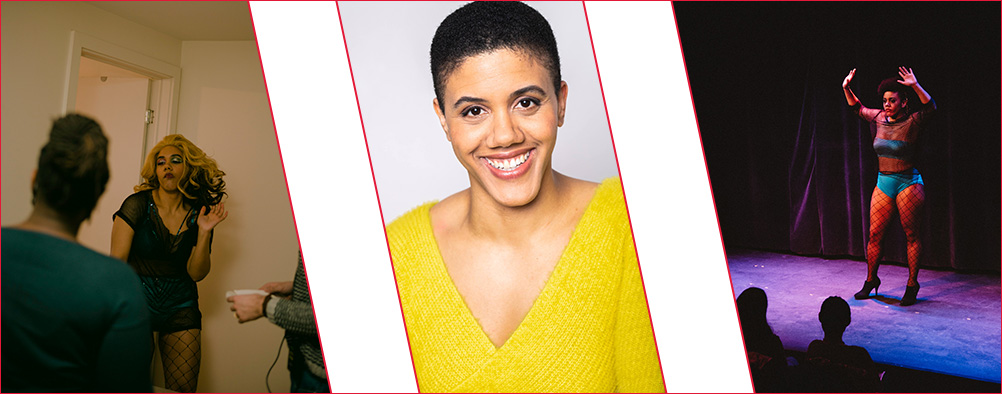
In showbusiness, as in life, timing is everything.
It’s a lesson that 2020 has only magnified for actor-writer Amanda Cordner (BA ’11), who had just finished shooting a film based on a play she created with her high school friend and creative partner David Di Giovanni (MFA ’17), when a pandemic hit.
The pair had been friends since they met at the regional arts program at St. Elizabeth Catholic High School in Thornhill, Ont., but parted ways after graduation: Di Giovanni headed to school in Montreal, and Cordner to pursue her dream of studying theatre at York. They remained close but it wasn’t until Di Giovanni was accepted to York’s MFA Theatre (Directing) program in 2015, that they finally collaborated on an artistic project.
“A month before he came back into town, he asked me if we wanted to create something together,” Cordner recalls. “We’d both been in theatre doing our own respective thing for eight years, him in Montreal, and me in Toronto.” At the time, Di Giovanni presented Cordner with two seemingly contradictory articles that would become the basis of the script for Body So Fluorescent: an editorial piece from Time magazine called, “Dear White Gays: Stop Stealing Black Female Culture”; and the response, “Dear White Gays: Don’t Listen To Time Magazine”.
“Both had pretty sound arguments,” says Cordner. “So we started discussing what the question is that we’re trying to pose, like what happens when one’s expression becomes another’s oppression?” With this in mind, they applied to the Rhubarb Festival at the Buddies in Bad Times Theatre in Toronto, and were accepted to produce an experimental 30-minute piece in one month. As Cordner was working and auditioning—and Di Giovanni completing his master’s—they created the play, which came to life as a one-woman show starring Cordner, and was presented at the Rhubarb Festival in 2016. They’ve since developed it into a one-hour piece, which they’ve toured across Canada and the U.S., and premiered at SummerWorks Performance Festival to critical acclaim in 2018.
“It raises questions about identity,
self-expression, sexuality and race,
and how these all intersect on
the dancefloor in the gay club scene."
“This brings us to this past December,” says Cordner. They applied to the Queer Your Stories short film competition with the Inside Out LGBTQ+ Film Festival and outACTRAto. “And we won!” They were awarded the prize in January and quickly got a production team together to shoot the film over three days on the last weekend in February. It’s set to premiere at the festival in October.
The film, which differs slightly from the stage production, begins with two friends getting ready for a night out at a club, and quickly unravels to reveal a deeper conversation about appropriation of Black culture. “It raises questions about identity, self-expression, sexuality and race, and how these all intersect on the dancefloor in the gay club scene,” says Cordner.
It also shines a light on internalized racism and homophobia. “David and I talked about our own experiences—him as a gay man, me as a Black woman—and [what it means] to be a Black woman in the gay club scene.”
Though they had been close friends for years, Cordner shares that Di Giovanni admitted he had never understood the microaggressions and unconscious bias she experiences as a Black woman until he witnessed it firsthand while touring the show to different cities. “It has been difficult getting produced in Toronto, our hometown,” she says about trying to pitch the show to different theatre companies. “No one got back to us.”
“But when we do show this piece, the people that we encounter will say, ‘Oh my gosh, I’ve never thought of it this way.’ And this piece is not to point fingers, it’s not to call anybody out. It’s to ask a very specific question and engage people in conversation. [To] ask yourself, ‘Where do you see yourself in this?’”
Toronto’s b current theatre company was set to produce the stage production in November, however the team is currently working on a way to present the show in a digital capacity, due to the COVID-19 pandemic. “Timing in this life is always out of our control,” says Cordner.
This has never been truer in light of the recent protests and reckoning in support of the Black Lives Matter movement. In late May, Cordner and the film’s creative team launched a fundraiser to complete post-production when news of the tragic death of George Floyd in Minneapolis sparked a massive outcry around the world.
“Everybody started asking, ‘How can I support Black people’s work? What can I do?’” says Cordner. “I think it’s even more perfect to release this film at this time, because people are ready to see it.”
